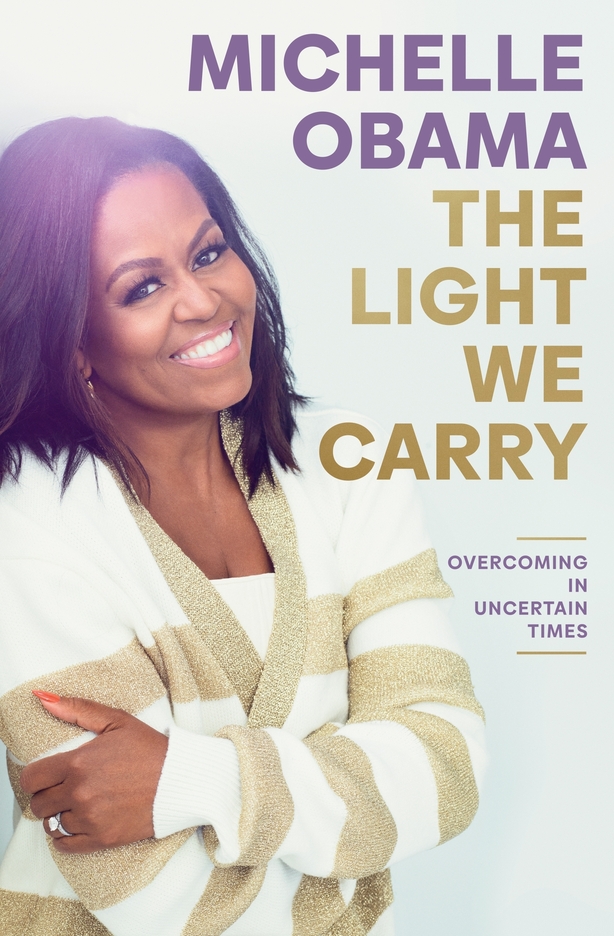As a self-help (or "personal empowerment") skeptic, I cracked open Michelle Obama's latest book with a healthy dose of doubt. This is probably exactly how Michelle Obama would want me, anyway - a stickier screw for turning.
The Light We Carry is the former First Lady’s guide to overcoming uncertainty and challenges, both macro and micro, her "toolkit" of methods for keeping a cool head whether she’s writing her now-famous "When they go low" speech at the Democratic National Convention, watching her husband pace the Oval Office, parenting her two daughters in the public eye or spending her first Christmas with Obama in his Hawaiian hometown.
It aims to help readers be "more comfortable, less paralysed, inside of uncertainty". Coincidentally published the same week that Donald Trump announced his intention to rerun for office in 2024, it could also be seen as a political manifesto of sorts, a lifeline for the potential future where that run is successful.
True, this book – Obama’s second publication, four years after her worldwide bestseller Becoming – comes with the expected positivity platitudes, the inspiring anecdotes, the chapters that wrap up neatly at the end like parables. True, it gets tiresome, especially if you’re not used to it.
But it’s also true that a few days into reading it and I was bringing its lessons into conversation. "Michelle Obama says this", "Michelle Obama says that".
More than most motivational speakers, Obama has lived a life worth screening for lessons. From growing up in a crowded Chicago home with an ailing father and a no-nonsense mother, to working her way through corporate law and entering the White House, Obama – an extrovert who loves a crowd, she writes – spills over with observations gleaned from her years of public-facing work.
A glimpse at "the levers and hydraulics of how I get myself through" is then, of course, a tantalising promise, an insight into how she gets it done.
She writes emphatically about her experiences and the lessons they imparted, beginning the book by reflecting on her hard-working family. She recalls how her father’s disability taught her "what it feels like to be different, to move through this world marked by something you can’t much control".
"Even if we weren’t dwelling on it, that differentness was always there. My family carried it. We worried about things that other families didn’t seem to worry about", she writes.
She has an arresting way of telescoping out from the deeply personal, such as tenderly touching foreheads with Barack in a stolen private moment, to the macro and political, thinking about the country as she saw it during her Becoming book tour.
Obama is intent on being "real" in this book, such as how she took up knitting to calm her overactive mind. This is quickly weaved into a convincing metaphor for her history: knitting is "buried" in her DNA, as the women in her family traditionally turned to needlework to sustain their families in even more racially torn times.
She’s also shrewd with the details she shares, aware of the public perception of her, her marriage and her family after eight years in the White House. The stories often skewer this perception and add depth, and are told with a knowing smirk.
Obama’s audience is a particularly harrowed one, which has endured an ongoing pandemic, years of disrupted life, broken communities and loss. It’s also one that witnessed a Republican presidency gone AWOL, with catastrophic consequences. It’s been as tough a few years for us as it’s been for her, and her empathy and fury comes through.
So when she writes about overcoming fear and uncertainty, you listen.
She’s candid and charming about early brushes with fear that taught her to become "comfortably afraid": "learning to deal wisely with fear, finding a way to let your nerves guide you rather than stop you". She recalls how her mother would make her walk home from school alone at five years of age, meeting her at the gate as they both exhaled a sigh of relief.
The chapter "Partnering Well" is a highlight, charting the early beginnings of her romance with Barack and the knots they had to unpick throughout their 30-year marriage. "The only love story I know is the one I happen to live inside every day", she writes.
There are refreshingly honest insights, such as Michelle’s hot temper, defying at least this reader’s uninformed assumption of her as an always-cool and calm character. There’s practical tips on how to navigate differences in character, such as how – and why – each partner deals with conflict, tips the couple have learned from marriage counselling.
There’s also reminders of their fierce love for each other: "As far as I’m concerned, I’ve only ever had one real home. My home is my family. My home is Barack."
It’s not a book for everyone. There are many instantly quotable lines, seemingly designed to be saved in a Notes app or added to a mood board: "Self worth comes wrapped in vulnerability"; "We become bolder in brightness." None of these is incorrect, of course, but they do leave you looking for the real meat of the book.
More than anything, this book is an effective advertisement for her previous one. Many anecdotes are introduced by way of a reference to their lengthier inclusion in Becoming, which left this reader feeling like all the good stuff was happening off stage.
As with any book like this, when it comes to Obama’s life lessons you’ll take away what you need and leave the rest. The stories are charming and insightful, but deliberately light in touch and told with a graceful wisdom and comforting wit. You believe her.

The Light We Carry is published by Penguin


